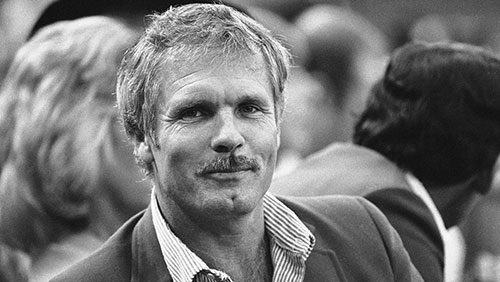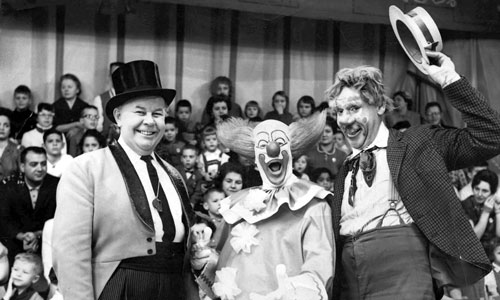Ted Turner's Satellite Of Love
These days, Ted Turner's media mogul status is just a footnote, but when he turned TBS into a superstation in the '70s, he remade television forever.

Ted Turner was the Steve Jobs of television, and that's not hyperbole
Remember the scene in the movie UHF where Weird Al Yankovic had to hold a telethon to keep his home-grown television station on the air? Entertainment mogul Ted Turner actually had to do that himself at one point when his low-powered Atlanta-based UHF station, WTCG, had trouble paying the bills.
And it's a good thing he did, because that telethon set the stage for the cable television revolution.
Turner's WTCG—which back in the 1970s was actually a lot like Yankovic's network, down to the inexpensive down-home local programming—eventually became WTBS, the first local TV network to turn into a superstation on a national scale.
He was and is a weird, crazy dude—you have to be when you own 2 million acres of ranchland—but he's always been crazy like a fox. And there was no point where Turner was crazier than the point where he stepped into his office and told his employees that he planned on putting his channel on a satellite in an effort to compete with the NBCs and CBSes of the world.
Turner told his staff about this plan by showing off a small model of the RCA Satcom 1.
"We all stared at this object sitting on the conference room table," onetime sales exec Bob Levi said in a retrospective piece. "This particular model looked as if someone had backed over it in their driveway. None of us was really sure what this all could mean. We talked to other broadcasters in town, and they all said it was folly."
In 1976—the same year that two guys named Steve started building a bunch of computers in a garage—that signal went up in the air, and it was quickly obvious that what he was doing was not folly.
By 1979, Turner's network had a new name—WTBS—and a national reach. And the rest is history.
Ted Turner, genius
In an era of tech CEOs who regularly rock the boat, Ted Turner feels more like a John McCain-style "maverick" than a Jobsian leader. And—to be totally accurate—he's not the kind of guy who rocks the boat, because he's an expert yachtsman who won the America's Cup in 1977. Not that he isn't eccentric: He chewed tobacco and tried to manage a baseball team one time. He married Jane Fonda. He created a cartoon in which a superhero saved the world from pollution. When the Olympics were boycotted pretty much all the time, he created his own version of them. And he had bizarre theories on the end of the world.
But in terms of the sheer amount of innovation he did, he comes a lot closer to Jobs, as broadcasters go. Turner was effectively writing the script for an entire industry, one that at this point had little experience with niche content, and he was a small fry competing with major players dabbling in a new market—like future Turner owner Time Warner, which had launched HBO a few years earlier.
In less than 15 years, Turner took a profitable business that sold billboards—one that he inherited from his father, who died in 1963, at age 24—and turned it into a company that had a national television presence.
Using a collection of syndicated content that local TV stations didn't even want anymore, he created a direct competitor to those same local stations, along with the major networks, at an incredibly low price. He had the foresight to figure out that sports were a huge ratings-driver and would be hugely important to his network's growth, so he bought the Atlanta Braves and Atlanta Hawks. And he streamed all this regional content nationwide, despite people telling him he was crazy. (He did another crazy thing a few years later, when he created CNN. Again, crazy like a fox.)
"He’s a genius," former CNN president Tom Johnson told The Hollywood Reporter in a piece about Turner. "He was exceptionally important in the media landscape. We shall not look upon Ted Turner’s kind again."
Some of this nuance may be lost now that he's not in our faces all the time like he was in the 1980s and 1990s and no longer owns all this stuff (thanks, Time Warner), but he helped make cable a relevant medium, setting the stage for it to come into our homes and—more importantly—become relevant to our lives.
$100M

Bringing local culture to a national audience
TBS wasn't the only superstation game in town, obviously. Other networks had a similar effect on the country, most notably Tribune Company's WGN, which began putting its feed on satellites about a year after Turner did the same. (Occasionally, in cases such as the Max Headroom incident, this became problematic.) Other stations followed suit: WSBK in Boston, WPIX and WWOR in the New York region, and KTLA in Los Angeles, among others.
Some had national reach, while others only touched specific regions of the country. But the ones that could keep their feeds going nationally, especially in the days before Viacom and Discovery splintered the market, became akin to national cheerleaders for their local communities.
A great example of this is the rise of Bozo the Clown, a bit of regional entertainment that had become popular nationwide, with the character being recreated in 182 separate local versions. Bozo had the most success in three large cities—Boston, Washington D.C., and Chicago—in the 1960s and 1970s.
While Boston's version of the show, which was overseen by brand owner Larry Harmon, was technically the "official" Bozo—owing to its nationwide syndication—it was Chicago's version that ultimately became the most popular, thanks to a certain superstation that turned a regional phenomenon into a national one.
“Around the office, we laughingly said of the original concept of having a circus with Bozo as the headliner, ‘Who knows? It might even last a year,’” original Bozo Bob Bell said in 1987. “If something lasted 13 weeks or 26 or 39, you were lucky. It was nothing anyone ever hoped or even imagined would last as long as it did."
Chicago's love affair with Bozo was long-lasting—parents would have to wait a decade to get tickets to the show for their children—but with WGN's satellite signals leading the way, it eventually became a national love affair.
“You almost have to ask yourself, What took them so long? All the other major superstations, like TBS, made this move about a decade ago, and they have since made a ton of money.”
— Derek Baine, the research director for SNL Kagan, discussing WGN America's ambition to become yet another cable network that airs critically acclaimed dramas. WGN, which broke off ties to the Chicago version of the network last year, was the last nationally syndicated superstation prior to its conversion to a basic cable channel. Part of the reason for the change was pure economics: All those syndication fees on WGN's programming, combined with FCC limitations on the local feed, made the network less profitable than other networks such as FX and AMC, and WGN was missing out.
Much like "You Can't Do That on Television," the superstation was an idea with a limited shelf life. There was no way the concept was going to last forever in an age when cable television praises originality.
The Weird Als that made independently owned broadcast networks interesting—the Ted Turners of the world—were willing to try anything to get you to watch. Don't believe me? Let me tell you about Future Shock. During the pre-Superstation WTCG days, Turner's network had a late night show where James Brown—yes, that James Brown—hosted what was effectively a local version of Soul Train. (You can see a clip here.)
Now, instead of crazy-unusual experiments like that, our local television stations air a ton of court shows instead—most of which are barely any different from one another. The digital subchannels like Antenna TV and THiS are vaguely interesting in a I-can't-believe-this-is-on-TV kinda way, but local productions are few and far between, and that's sad.
Where's Ted Turner when you need him?
:format(jpeg)/2018/04/dyc5y5rs39ldeqtia4ke--2-.gif)
/2018/04/dyc5y5rs39ldeqtia4ke--2-.gif)

/uploads/ernie_crop.jpg)